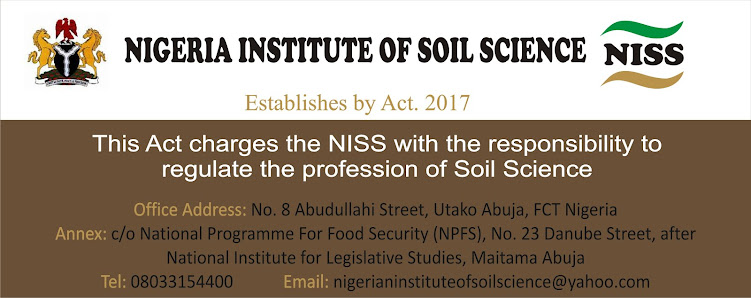INTRODUCTION:
Sustainable agricultural growth requires greater
emphasis on productivity growth in view of declining cultivable areas:
Application of innovative techniques for
agricultural production is a fundamental and crucial step in improving
livelihoods in most societies. There is generally a strong correlation between
increased agricultural research investment and agricultural productivity. Our priority - Ensure that
research makes the greatest possible contribution to raising human welfare
using the limited available resources while attracting more investments.
This presentation examines investments in
agricultural research and its impact on food security in Nigeria.
WHY INVEST IN AGRICULTURAL RESEARCH?
Poor funding of research leads to inability to
deliver improved agricultural technologies, achieve increased productivity and
other related benefits. There is a high rate of return to society on
investments in agricultural research. For example, for every US dollar spent on
agricultural research in 2010 in Brazil, US$9.35 accrued to the society.
SOURCES OF
AGRICULTURAL RESEARCH FUNDING IN NIGERIA
Primary source of funding is the Federal Government
as Private sector investments are negligible , Capital Budget releases are
usually incomplete (about 50% of approved ) and often out of tune with research
work plans .
AGRICULTURAL RESEARCH SPENDING TREND IN NIGERIA
Investment in agricultural research
doubled between 2000 & 2008 owing to high personnel cost and increased
capital allocation. However, allocations demonstrated a high level of
fluctuation and instability (Figure 1)
Figure 1: Nominal Capital budgetary allocation
to NARIs (2000-2014)
Note: 2009 figure includes ₦1B released
under CARGS, while 2012, 2013 and 2014 includes R&D allocations of ₦2.25B,
₦2.71B and 0.70B, under the ATA in Ministry’s.
AGRICULTURAL
RESEARCH SPENDING TREND IN NIGERIA
Figure 2: Distribution of 2014 budgetary allocations
to agricultural research in Nigeria
Source: Abubakar (2014)
AGRICULTURAL RESEARCH SPENDING TREND IN
NIGERIA
The national expenditure in major imports by far outweighs
agricultural research investments in Nigeria. For example, 1 week rice import = 2010 Capital allocation to NARIs (₦6.9 Billion)
Source: Malomo (2013)
PERFORMANCE OF NIGERIA IN FOOD SECURITY
Nigeria has made significant progress in food
security status (Figures 4-6) and that explains why the country achieved MDG 1
about 2 years ahead of the target date.
PERFORMANCE OF NIGERIA IN FOOD
SECURITY
Figure 5: Prevalence of food inadequacy in Nigeria
(1990 – 2012)
Prevalence
of food inadequacy reduced by about 67% between 1990 and
2010
PERFORMANCE OF NIGERIA IN FOOD SECURITY
Figure 6: Number of undernourished people in
Nigeria
Table 1: RELATIONSHIP BETWEEN INVESTMENT IN AGRICULTURAL
RESEARCH
AND FOOD SECURITY INDICATORS IN NIGERIA.
Class of food security indicator
|
Food security indicator
|
Correlation
|
Food availability
|
Average dietary energy supply adequacy
|
HP
|
Share of dietary energy supply derived from
cereals and roots
|
HP
|
|
Average supply of protein (gr/cap/day)
|
HP
|
|
Average supply of protein of animal origin
|
HP
|
|
Average value of food production
|
LP
|
|
Food accessibility
|
Depth of food deficit
|
HN
|
Prevalence of food inadequacy
|
HN
|
|
Prevalence of undernourishment
|
HN
|
|
Food stability
|
Domestic food price volatility index
|
HN
|
Cereal import dependency ratio
|
LN
|
|
Per capita food supply variability
|
MN
|
Note: HP = High +; LP = Low +; MP = Medium +;
Improved investment in agricultural research will
lead to better availability and access to food as well as reducing
vulnerability to food insecurity in Nigeria.
AGRICULTURAL RESEARCH TECHNOLOGIES AND IMPACT ON FOOD SECURITY.
A study commissioned by ARCN showed that over 170
agricultural technologies were developed by the NARIs from 1997 – 2008 (ARCN,
2010).
Over 50 technologies have been developed by NARIs,
universities and other stakeholders under CARGS in the course of implementation
of the scheme. In 2008 – 2009, ARCN also commissioned a series of impact
assessment studies of technologies developed by the NARIs to measure benefits
to end-users. The studies revealed that agricultural technologies in Nigeria
had positive social and economic impacts on adopters and other end-users.
Annual mean monetary gain to society ranged from low
for early bearing cocoa variety to high for six rice varieties studied (Table
2).
Adopters of many of the technologies were found to
be more food secured than non-adopters. Both expenditure and income-base
poverty gap indices indicated worsening poverty towards non-adopters. Other
social gains abound.
NARI
|
Commodity
|
Technology
|
Year of Release
|
Monetary gain to society
|
CRIN
|
Cocoa
|
Early bearing variety (precocity)
|
2004
|
Low
|
NRCRI*
|
Cassava
|
TMS 30572
NR 8082
|
1990
1998
|
Moderate
|
NCRI**
|
Rice
|
FARO 44, 46 & 52
FARO 48 & 51
FARO 55
|
1992
2001
2003
|
High
|
IAR***
|
Maize
|
SAMAZ-11
|
2000
|
Moderate
|
LCRI
|
Millet
|
LCIC-MV-1
|
2000
|
Moderate
|
NAPRI
|
Chicken
|
ShikaBrown Layer
|
2000
|
High
|
Note: *Developed by IITA, Ibadan and NRCRI, Umudike;
**Developed by IITA, IRRI, AfricaRice and adapted by NCRI; ***Developed by IAR,
Zaria and IITA, Ibadan
Source:
Phillips et al. (2009, 2010)
WAY
FORWARD
*Massive and sustained public and private
investments in R&D are required in order for agriculture to benefit from
developed technologies.
*Need to target technologies that enhance improving
efficiency of farmers’ use of agricultural inputs.
*Need to separate research funds from capital budget
to ensure timely releases and increased research outputs.
*Need for greater focus on adding value to outputs
from primary production through processing.
*Improve research-extension linkages towards
enhancing the social benefits derivable from agricultural research investments.
CONCLUSION
*Improving agricultural research investment would
result in better food security status in Nigeria.
*Owing to the time lag between investment and
research output, there is need for sustainable improved resources mobilization
for agricultural research operations in Nigeria.
*Hence, the justification to reform and restructure
the research system to be more responsive to the needs of end-users.







